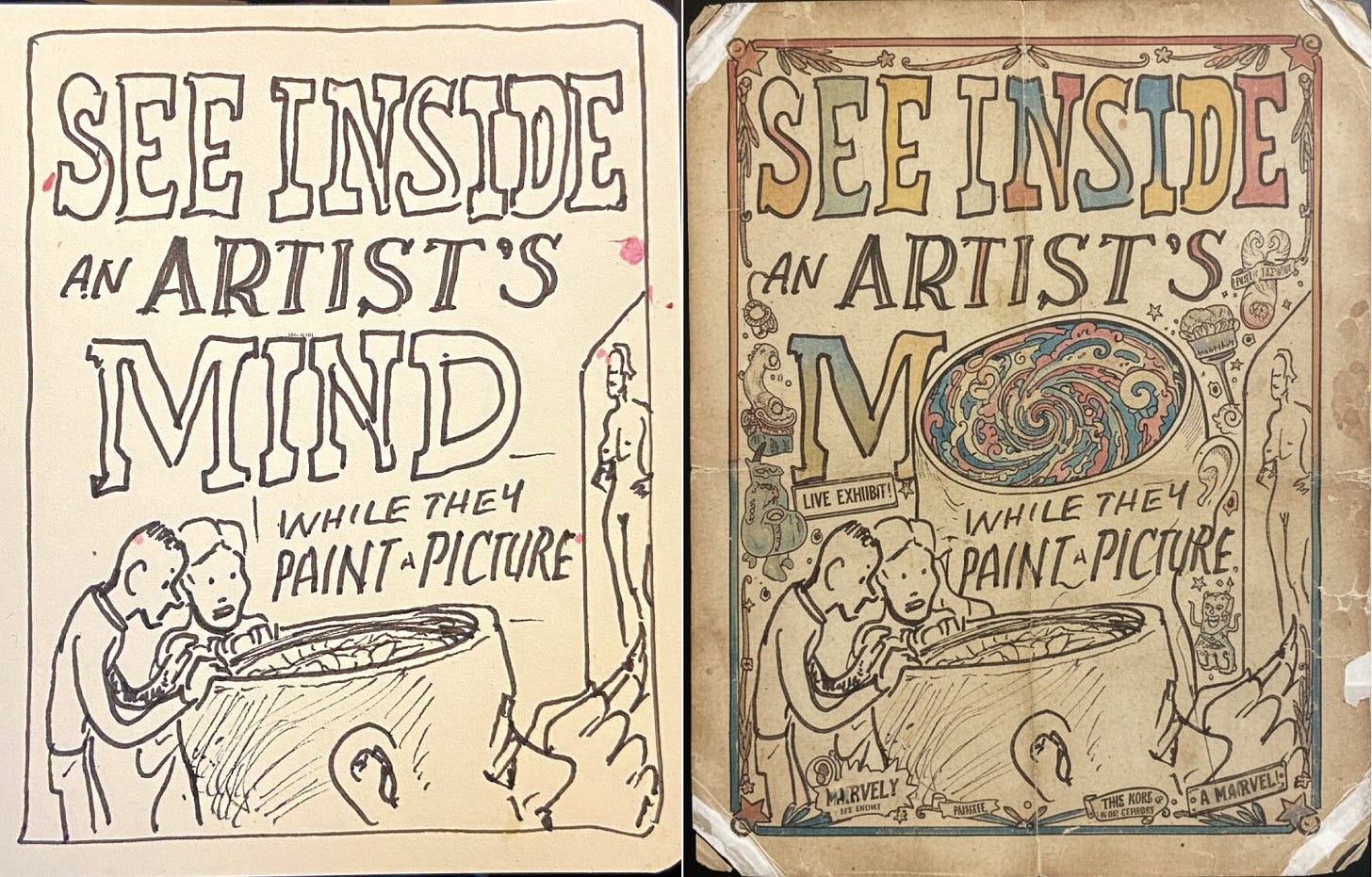My Issues with AI in the Creative Process
These 10 challenges affect how we make—and consume—art
Left: Me, doodling at breakfast, Right: Processed through Google Gemini. ChatGPT wouldn’t touch it. See below.
We’ve all heard artists gripe about how AI models gulp down copyrighted material and bury us in slop, but that’s not what I want to talk about here. My issues with AI are more fundamental, and I rarely hear anyone mention them.
1. Option Overload
It’s so easy to generate variations on an idea, but what do you do with all those unused images, videos, drafts, and outlines? Do you save them in folders, or discard them by the wagonload? Having so many choices is its own burden.
2. Creative Intimidation
AI produces results instantly and effortlessly, yet for us humans, creativity remains just as difficult. Beethoven scratched out his manuscripts through sheer will and discipline. If we dump the digital tools and try composing with a dip pen and five-line staff—it’s still hard, maybe harder. Isn’t that true for you?
3. Labor Devaluation
We’re all assaulted by ads touting AI benefits. Even AI-skeptical channels are accompanied by pro-AI ads. Most ads try to get us to buy in on the idea that some part of our creative process is boring, laborious, or tedious. The same was true of manufacturers of the “labor-saving devices” during the industrial revolution. Back then they tried to convince us that hand labor was unworthy of us. Do we really want to internalize those values?
4. Workflow Disruption
Where should AI fit in—early brainstorming, mid-stage refinement, or final polish? Each stage is up for grabs. Complex creative pipelines, from animation to publishing, are being rewritten overnight. I don’t often pity CEOs (they’re paid too much), but I do wonder how they rebuild morale in the middle of this storm.
5. The Cheerfulness Problem
AI is endlessly agreeable. It affirms even our weakest ideas. It never says, “That’s a stupid idea.” But we all need a tough editor who sharpens our thinking. Getting to something truly new has never been easy, and computers won’t change that.
On the other hand, when you run up against content guardrails, the model just gives you a terse refusal and in effect tells you “You’re not allowed to imagine that.” No reasons are given.
6. False Confidence
Can we be creative in a domain where we lack skill? When AI fills in the gaps, it’s easy to think we know more than we do. But taste and judgment only come from struggle, experiment, and failure. If we outsource the effort, what happens to our sense of discernment and our confidence in our own capacities?
7. Audience Erosion
The whole idea of art is to communicate with fellow humans. Yet on some platforms, as much as half the “audience” are said to be bots. If real people stop caring about what we make, what becomes of the basic human connection that art requires?
8. Novelty Fatigue
Sometimes it feels like we’re working in a woodshop where each week they bring in fancy new tools for us to use. Sora2 is the latest example of a novelty app. People seem hungry for the latest style or technique, but once the wave passes, they quickly tire of it and are looking for the next wondrous thing.
9. Homogenization Pressure
AI tools are trained on the same ocean of data, which means they pull our creations toward the average. Even when we try to be original, the gravitational pull of the average is strong. The result is a quiet erosion of individuality.
10. Creative Displacement
The more we collaborate with AI, the harder it is for the audience to know who is the real creator. Are we acting as author, director, or producer? Do the tools empower us or handicap us? Is it good for everyone to be an artist…or an art director? Is this a new creative renaissance or are we drifting ever farther from the creative vortex? If that’s happening, what happens to our sense of purpose?
I don’t know the answers to these questions, but I’d be interested in your thoughts and your experience. In the comments, please let me know if your experience resembles—or differs from mine. If you’ve avoided AI as a creative assistant, why have you done so?





‘Most ads try to get us to buy in on the idea that some part of our creative process is boring, laborious, or tedious.’
I think this is a key point that many tech leaders misunderstand. The creation process _is_ arduous, but very much worth doing. It requires a lot of thought, patience, and discipline, all of which are beneficial for human happiness. An AI generator may make a more polished ‘painting’ than a new artist, but it cannot give the same sense of satisfaction or peace.
We simply don't know how the Pyramids were built, or how the Antikythera mechanism was made, or — more shockingly — in the US, we don’t know how many manufacturing processes work. Why? Because we stopped doing these things, let machines or other people do them for us, and so we’ve forgotten. That’s my biggest fear with AI: a future generation that has forgotten entirely how to create: how to write, how to paint. And if we forget how to create, that’s the end of everything.